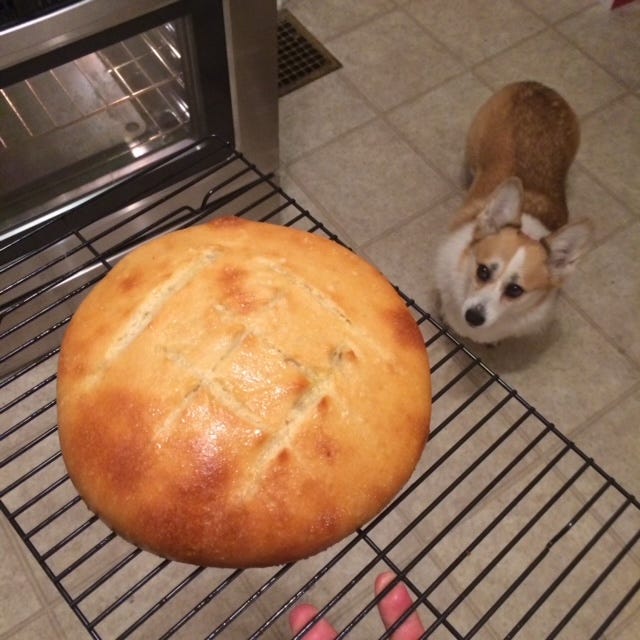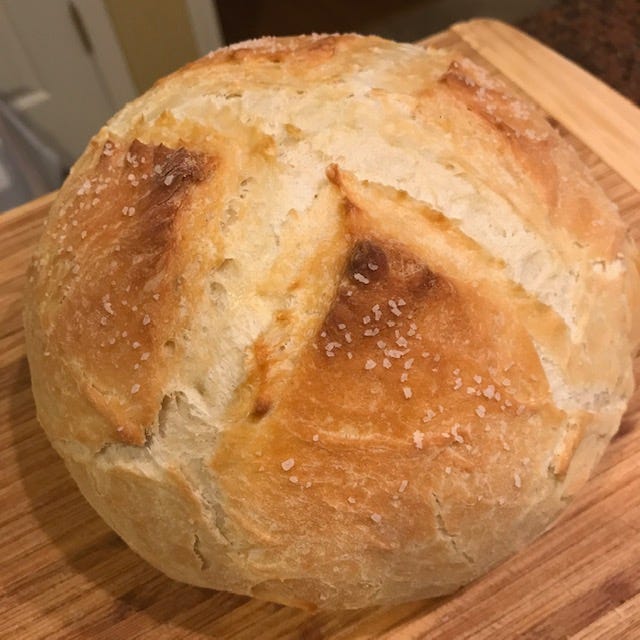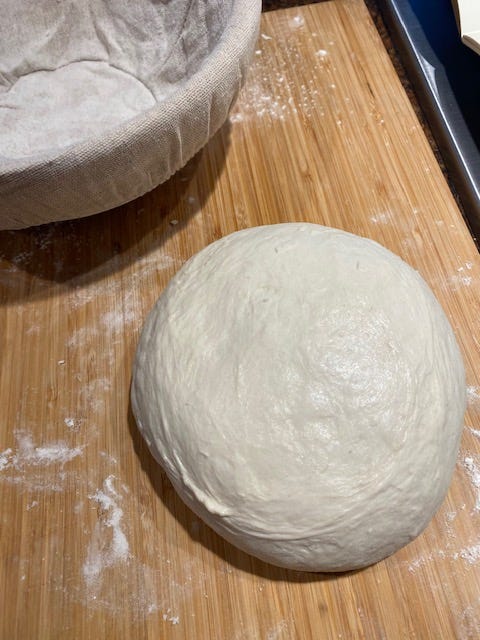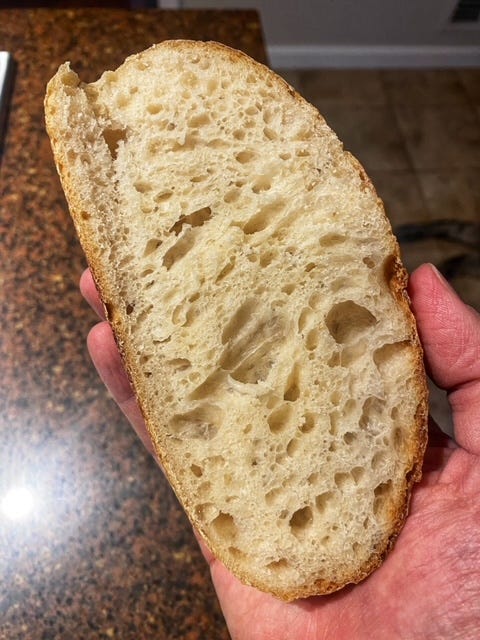I’ve always been afraid of bread.
Not in a literal sense, of course, and not in a carb-conscious way, either. Let me state for the record that I have a firm and loving relationship with carbohydrates that no man can put asunder. There’s few things I enjoy more than breaking into a fresh loaf of sourdough and going full duck-pond mode on it.
No, I’ve been afraid of making bread.
I’ve long believed that people are either bakers or cooks by nature—that is, naturally predisposed toward either the kind of careful, logical, sober precision required by baking, or to the loose, improvisational creativity allowed when cooking. I’ve always placed myself firmly and proudly in the latter camp; I like to make a big mess in the kitchen, and figure things out as I go.
If they go well? I’ll write down the recipe afterwards, as best as I can remember it.
My favorite dishes to cook have always been one-pot meals—chilis, soups, stews, pastas, paellas, jambalayas—anything big and busy and with a whole lot of different things going on. If I see 32 ingredients in a recipe? Buddy, count me the hell in. I love spending a Sunday afternoon standing over a simmering pot, tinkering and tweaking and tossing in seasoning to taste, knowing I can always cover up errors as I go along.
This is a microcosm of my personality at large—I’ve always been someone who favors an essay test over a math problem, a jury-rigged solution over a precise answer, a feeling over a fact. I’m a bullshitter, to put it another way. I’m happy to talk my way in and out of situations without concerning myself too much with nagging exactitudes.
Making bread is the absolute antithesis of this.
Bread either works, or it doesn’t. If you get one thing wrong? It’s probably going to ruin the whole thing. When you’re dealing with just flour, water, salt and yeast, there’s nowhere to hide your mistakes.
Bread knows if you’re full of shit, no matter how smooth a talker you are.
I’ve been working through a bout of imposter syndrome lately.
I don’t normally lack for confidence, but the last few months, I’ve found myself doubting my capabilities in a number of areas.
I’ve worried about my parenting, wondering if I’m actually a good dad or just someone who plays the character well.
I’ve worried about my abilities as an architect, fretting that there’s always going to be one more thing that I didn’t consider, some should-have-been-foreseen condition that’ll only become known during construction months or years later when it’ll be far more difficult and costly to fix than if I’d just thought of it now.
I’ve worried as a self-taught food and drink writer, thinking about how boorish and clumsy my roughly-tested recipes and cobbled-together cocktails must look like to people with more experience, credentials and taste than me.
I’ve worried as a writer in general, wondering if I have what it takes to ever write something truly lasting.
I worry that I talk a good game and I can’t back it up.
A few weeks ago, I decided to bake some bread.
I signed up for a “beginner’s sourdough” class offered by The Grainwright, a wonderful bakery here in Louisville, Kentucky. I chuckled a bit about the notion of taking up sourdough three years after it was seemingly everyone’s pandemic project, but I’ve been a huge fan of The Grainwright’s breads1, and couldn’t pass up the opportunity to learn from them firsthand.
Of course, I was fearful.
I’ve only attempted to bake bread a few times in my life, but the results have been decidedly mixed. I’ve had some decent luck making shokupan, a Japanese milk bread, and I’ve done some pretty okay focaccias. My efforts into making simple boules, however, have been more or less abysmal—flat, dense loaves with no rise, no color, no flavor. One time I tried to bake a loaf in a Dutch oven the way I’d heard you were supposed to, and it adhered to the pot so firmly that I tore off the entire bottom crust of the loaf removing it and had to soak the pot for a full day before I could scrape it off.
I’m a cook, not a baker, I’d say. (You know, bullshitting.)
If you haven’t already, upgrade to a paid subscription today to make sure you receive all three weekly editions of The Action Cookbook Newsletter, including the massive and fun-filled Friday Newsletters!
On the day of the class, a three-hour seminar held upstairs at Louisville’s Logan Street Market, where The Grainwright maintains a stall, owner and lead baker James led us through a recipe both simple—only flour, water, salt and starter—and complex, relying on careful attention to timing, temperature and technique.
He taught us how to mix the dough, how to fold it, ferment it, shape it, proof it, slash it and bake it, reminding us that the only way to truly get good at baking is with “hands in dough”. At the end of the class, each of the twenty attendees went home with a freshly-baked loaf, though by merit of compressing a 48-hour process into a three-hour class, I couldn’t really say that *I’d* baked it.
I’d still have to prove—if only to myself—that I could recreate it at home.
The next day, I began my own effort, carefully studying the copious notes I’d scribbled into my notebook during the class and hoping I’d correctly understood everything James had said. I carefully weighed out my ingredients—300g of flour, 210g of water, 6g of salt and 30g of starter. I mixed the ingredients into a shaggy dough, then allowed it to rest for an hour, testing its elasticity both before and after, noting how it got stronger after the rest. I stretched and folded it as I’d done in the class, then put it into a sealed plastic container to bulk-ferment on the counter overnight.
The following morning, I popped it out of the container where it had grown overnight, and nervously began to shape it—first folding in six turns, then pulling it across the countertop to form a tight ball. It went into a lined banneton, then into the fridge to proof and cold-ferment for another twelve hours.
That evening, I placed the dough—straight from the fridge—into my cast-iron double Dutch oven, thinking about my previous massive failure and how little I looked forward to scraping it off later. I gave the top a few slashes with a razor blade, spritzed it with water, and covered the pot. Into a 475-degree oven it went, and I held my breath for the next eighteen minutes until I’d remove the cover.
When I did, my heart sank. Most of the rise, or “oven-spring”, should’ve happened during this first phase, but the loaf looked flat.
I placed it back in the oven for the remaining 25 minutes, and hoped for the best.
I was pleasantly surprised to find that it actually did rise more during the second part of the bake, and had taken on a nice color, but I still didn’t know if it was any good inside. I scrupulously adhered to James’s admonition not to cut a fresh loaf for at least two hours after baking, though, lest it turn gummy.
Finally, after a tortuous several hours, I sliced it open.
It wasn’t perfect—I’d slashed a bit too deep with one of my razor passes, allowing a bit too much steam to escape on one side—but overall, it was pretty darn good, and worlds ahead of anything I’d ever baked before. It had a nice open crumb, a crisp, blistered crust, and a delicious flavor. My daughter—who routinely leaves the bread from her sandwiches untouched in her lunchbox—asked for a slice based on smell alone, and quickly came back for seconds.
Baking one loaf of bread successfully doesn’t change things.
I still have to work through my insecurities elsewhere as they come—parenting, architecture, writing and life in general are long, ongoing processes where success and failure take a long time to reveal themselves. But I realize now that perhaps that’s the appeal of being a baker in the first place: you either succeed or you don’t, but you find out right away.
Besides, it helps to be called out on your bullshit every once in a while.
—Scott Hines (@actioncookbook)
They also provided the buns for the Salmon Burgers I served up at the Lou Oyster Cult event at Louisville’s Merryweather last summer.









Two thoughts here:
1) I’ve avoided the parchment paper issue lately by switching to the BreadMat from Rosehill Sourdough. It’s reusable and it’s got little handles for putting it in and lifting it out of a screaming hot Dutch oven. https://rosehillsourdough.com/product/the-breadmat/ (I also love Mike’s ebook “Rosehill Sourdough” it’s $20 and explains sourdough better than any book I’ve ever seen. He’s a former engineer at Ooni and he’s also got great videos and whatnot. And his new product is a wood-pulp proofing basket that I like much more than my old linen/rattan ones.)
2) as for the cook/baker dichotomy I think it’s real, but I think we should shift our terms a bit. I think of it as cook/pastry instead. To me, cooking and bread baking share a lot in common. Both benefit from being rigorous and precise until you know your materials really well. Think back to when you first cooked. You used recipes. You measured. And now it’s intuitive. Bread baking is a lot the same. You can change hydration. You can add more salt. Less. Change your flours. Once you know the basic ground rules, suddenly improvisation is open to you. (And hell, depending on your ambient humidity/temperature/what that particular batch of flour is like/etc even that precise recipe in grams has to be adjusted using a bit of intuition.)
Pastry? That’s a world that doesn’t play so well with improvisation. That’s a world where precision and a cook’s mindset doesn’t play as well (excepting of course when you get to be wildly good at it, as it true with any art). The biggest thing I ever did to improve my bread baking was to let go of the idea of precision and it being different from cooking by a ton. Instead I just relaxed. Sure some things will not be perfect, but you still have bread and you can learn from the mistakes for the next time. That’s exactly the same as cooking.
I think the intimidating part is that we cook every single day and it doesn’t really take that long. You forget failure quickly. But with bread, we do it MAYBE once a week and it can take a whole day, so failure FEELS like a bigger thing.
"I’ve worried about my parenting, wondering if I’m actually a good dad or just someone who plays the character well."
I'm not sure there's much of a difference here.
I once opined that I wasn't sure if I've become less socially awkward as I got older or did I just figure out how to mimic what other people who were not socially awkward were doing and someone told me that it doesn't matter, because if I am doing that with any kind of regularity, it doesn't matter how I arrived there.
So if you're playing the character well, that means you have to be doing the things that would allow you to believe that, which means that you're more than likely doing the right things.